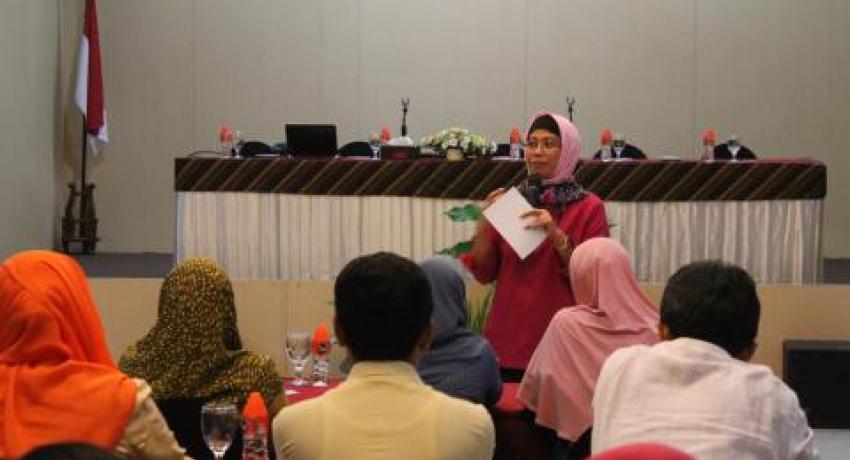On Tuesday, 24 Mei was held Opening and First Day of Bipa Teacher Training for basic and intermediate level in Hotel UNY. The training took place for 3 days, from 24 to 26 May 2016. Around 28 participants of basic level and 19 participants of intermediate level attended the training. They came from various backgrounds, namely Indonesian Language, English, Accounting, Russians, German Language, and France Language.
Opening the event was Dr.-Ing Satoto E Nayono, M.Eng, M.Sc., as the Head of International Affairs and Partnerships (OIAP). He himself also came to present the first material regarding BIPA as a strategy of internationalization.
The second material was presented by Prof. Suwarsih Madya, Ph.D. with the theme “Bipa Teaching: History, Visions, Missions, Goals & Principles, and Methods of Teaching Bahasa Indonesia as A Foreign language”. She ascertained that the participants of this training must be sensitive; they must listen to what their students want. BIPA could also be a comparative study between cultures, allowing interaction among foreign students to learn Bahasa Indonesia together. She added, “Don’t forget to teach gesture/sign language”.
“Bahasa Indonesia cannot stop exist” said Dr. Liliana Muliastuti as the 3rd Presented and Chief of APPBIPA (Afiliasi Pengajar dan Penggiat BIPA). She mentioned in Rembuk Nasional dan Kebudayaan 2016, Anies Baswedan (the Indonesian Minister of Education) argued that BIPA teaching must be national movement and it is possible that in the future there would be special certification and also major study for Graduate Program in universities that specializes in BIPA teaching.
In a question and answer session, two participants from Swadaya Gunung Jati University Cirebon asked some things related to the history of BIPA in a book, Government policy regarding the BIPA program, and guidelines for mandating graduates to become BIPA teachers.
In response to such questions, Ms. Liliana replied, "There is no book telling history of BIPA and this will be advice for APPBIPA". She also mentioned that BIPA is still new and that the policy has been issued this year. For institutions, BIPA teaching can be initiated with developing the course options, supported with teaching practice with foreign students.
In the second question answer session, Dr. Liliana Muliastuti explained that for teachers who are not from Indonesian Language Department, they can follow the certification program by using their portfolio. She also explained that there is no standard of levels in BIPA teaching. Each institution can develop their placement test by themselves.
"In the future, there should be standardization regarding political strategy or business associated with the BIPA, policy, books, and levels," said Ida Bagus Artha Adnyana, a participant from the State Polytechnic of Bali. "BIPA is internationalized, but we must protect our country with a clear regulation in order for foreigners to respect Indonesia." (Tiara)





